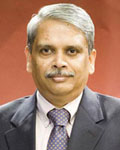 |
|
|
||||
BUDGET REACTIONS 2010-11
 |
R. Venkata Rao, Vice-chancellor, National Law School of India University , Bangalore The Veteran Has done a good job. Withdrawing stimulus packages, Enabling measures from the Enabling Government and focus on agricultural sector- these augur well. Withdrawal of subsidies to Petrol in a phased manner will be pragmatic. Let us remind ourselves of Steel. Congratulations to Pranab Da |
|
 |
Good initiative in background of fiscal deficit: FIEO Chief While President appreciated FM view to earnestly try to introduce GST from 1st April 2011, he felt that Government should have come with road map to force the issue. Mr A Sakthivel, President, Federation of Indian Export Organisations (FIEO) hoped that before introducing Direct Tax Code from FY 2011, the concern of exporters particularly SEZ units will be addressed. Non extension of sunset clause to software technology parksand EOUs will put pressure on such units said Mr Sakthivel which are already facing fierce competition from low cost economies besides struggling tomanageexchange rates. President FIEO thanked the FM and Textile Minister for allocation Rs 200 Crore to Tirupur, knitwear export cluster, for marine discharge project to meet environment concern. He also added training of 30 lac workers for textile unit will address capacity building concern of textile sector. FIEO Chief complimented Finance Minister for bringing down fiscal deficit from 6.9% to 5.5% in 2010-11. |
|
|
|
 Sri K. Harishchandra Prasad, President,FAPCCI, addressing on Union Budget-2010 on February,2010 at FAPCCI. Sri O.P. Goenka, Past-President and Sri M.V. Rajeshwara Rao, Secretary General of FAPCCI are also seen |
K. Harishchandra Prasad, President, The Federation of Andhra Pradesh Chambers of Commerce and Industry The finance minister had the daunting task to quickly put the economy on the high GDP growth, contain inflation, ensure food security and bring down the fiscal deficit. For this, he has to impart fresh momentum into the economy; he did so with certain innovation and with a broad brush. Therefore his budget is well-thought out and balanced one, and the budget paves a path and clear direction for greater growth in the coming years. He planned to bring down the inflation from 6.5 percent to 5.5 percent in 2010-11, and to 4.8 percent and to 4.1 percent in subsequent years. This is a bold attempt. He has also targeted an explicit reduction of domestic public debt/GDP ratio. He projected a GDP growth rate of 8.75 percent in 2010-11 and 9 percent next year and double-digit growth in the following year. These are most desirable goals and once achieved the country will be one among the few fast growing economies in the world. Thus it is a forward-looking budget. He increased the plan expenditure by 15 percent and controlled the non-plan expenditure to an increase of 6 percent. This is certainly a good indication of the government’s intention to control non-development expenditure and augurs well. He laid emphasis to improve the public service delivery mechanism and make public institutions transparent and efficient. He has given most desired thrust to the investment environment in the country, by simplifying the FDI regime, liberalizing the pricing of technology transfer fee and royalty payments, providing project import status with concessional import duties of 4 to 5 percent to warehouse handling equipment, clod storage units, cold room equipment for the food processing industry, refrigeration units, specified agricultural machinery, provision of central excise exemption for specified equipment in food processing industry, agriculture, plantation sectors. All these concessions not only improve the investments in agriculture, food processing industry and plantation sectors, but also contribute to higher productivity in those sectors, besides attempting to ensure food security. He did not roll back the excise duty stimulus package across the board but on a selective basis. This is a very welcome step and nurtures the fledgling economic recovery. He has provided interest subvention for giving boost to the exports. His focus on clean energy is timely. It prepares the country to face the future challenges in the energy sector. Development of infrastructure, urban and rural development is also given the right emphasis as is required for the growth platform. Education and medical and welfare sectors are given due importance to bring down the urban and rural divide. Overall this is a balanced budget. It aims to spur the growth with emphasis on welfare, women and child development, green revolution in some northern and eastern states, conservation of soil fertility and environment, non-conventional energy, dry land agriculture, water harvesting and watersheds. It is a growth-oriented, rural-development budget. It sustains growth and brings about a measured fiscal consolidation. |
|
|
 |
Kris Gopalakrishnan, CEO & MD, Infosys Technologies “The Union Finance Minister, Pranab Mukherjee presented a budget that has been focused on fiscal consolidation. The projected reduction in the budget deficit to 5.5% – down from 6.8% is a positive development as the country strengthens its growth after the recovery from the global recession. The highlights of the budget include the reduction in the fiscal deficit, an increased investment in infrastructure, raise in the personal income tax slabs and the enhanced focus on e-governance. However, the increase in excise duty, crude oil and petroleum products is a cause of concern, as they are inflationary in nature. In addition, there has been no focus on higher education in this year’s budget.” |
|
|